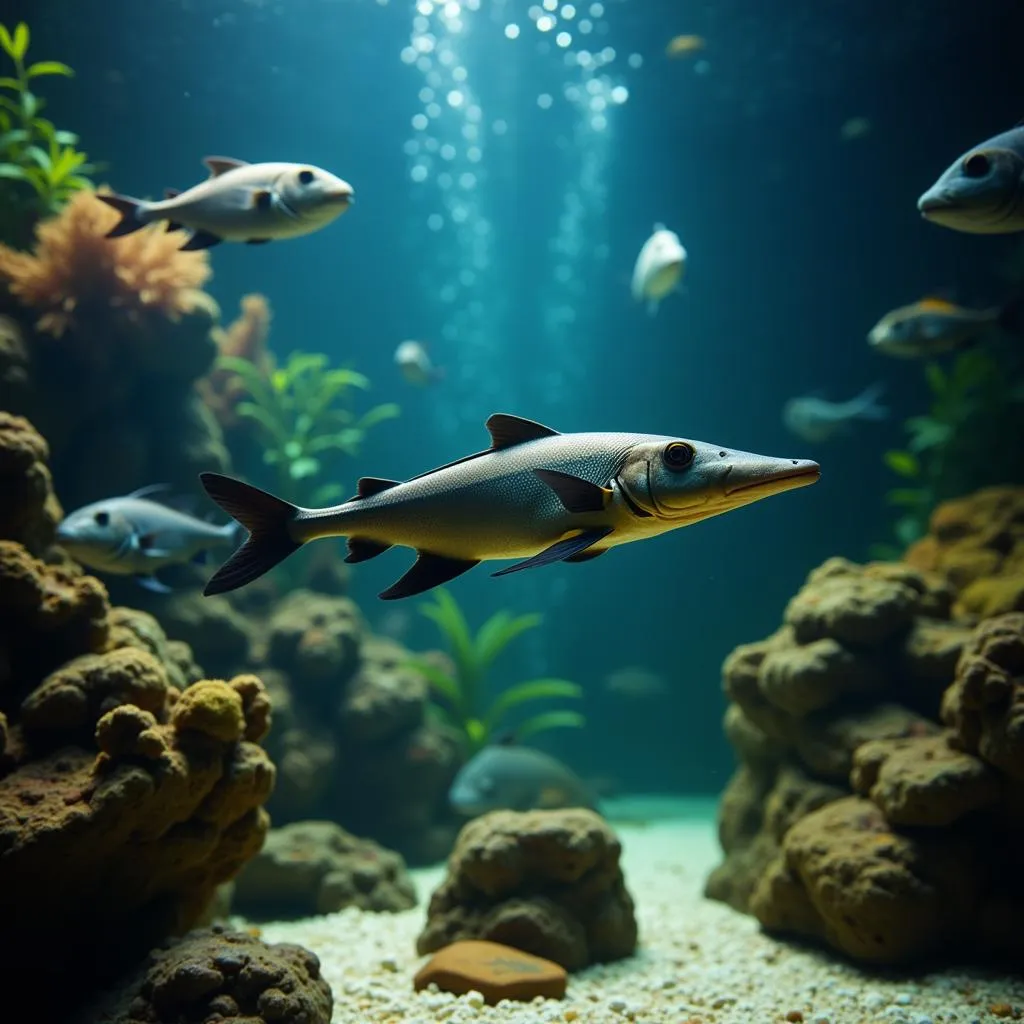The Complete Guide to African Knife Fish Care
The African knife fish, also known as the African knifefish, is a unique and fascinating freshwater fish that can make a rewarding addition to the right aquarium. Native to the murky waters of West and Central Africa, these nocturnal predators are known for their elongated bodies, sharp dorsal fins, and, most notably, their ability to swim backwards. If you’re considering welcoming an African knife fish into your home, understanding their specific needs and care requirements is essential.
Understanding the African Knife Fish
Before diving into the specifics of African Knife Fish Care, let’s take a closer look at what makes this fish so unique:
- Physical Characteristics: African knife fish have long, laterally compressed bodies that resemble a knife blade, hence their name. They lack pelvic and ventral fins, relying solely on their elongated anal fin for propulsion, allowing them to move gracefully through the water, even backwards. Their coloration is typically silver or brown with dark, vertical stripes that help them camouflage in their natural environment.
- Nocturnal Predators: These fish are primarily active at night, using their specialized electroreceptor organs to navigate and hunt in darkness. They are skilled predators, feeding on small insects, crustaceans, and even other fish in the wild.
- Peaceful Temperament: Despite their predatory nature, African knife fish are generally peaceful towards other fish species that are too large to be considered prey. However, they can be territorial with their own kind and are best kept singly or in a spacious tank with a carefully chosen community.
Setting Up the Ideal Aquarium
Creating a suitable habitat is crucial for the health and well-being of your African knife fish. Here’s what you need to consider:
Tank Size:
- Minimum tank size for an adult African knife fish is 55 gallons. These fish can grow up to 12 inches in length, and they need ample space to swim and explore. A larger tank is always better.
Water Parameters:
- Temperature: Maintain a water temperature between 73°F to 82°F (23°C to 28°C).
- pH: Keep the pH levels slightly acidic to neutral, between 6.5 and 7.5.
- Hardness: African knife fish prefer soft to moderately hard water, with a general hardness (GH) of 4-18 dGH.
- Filtration: Invest in a high-quality filtration system that can handle the bioload of these fish. Good water quality is essential.
Aquarium Setup:
- Substrate: A soft, sandy substrate is ideal, as it allows your African knife fish to burrow, a natural behavior for this species.
- Decorations: Provide plenty of hiding spots with caves, rocks, driftwood, and dense plants. This replicates their natural environment and helps reduce stress.
- Lighting: Since they are nocturnal, African knife fish don’t require bright lighting. Dim lighting, especially during the day, can help them feel more secure.
Feeding Your African Knife Fish
Feeding your African knife fish is relatively straightforward, but it’s essential to provide a varied diet that caters to their carnivorous nature:
- Live Foods: Live foods are the cornerstone of a healthy diet for African knife fish. Bloodworms, blackworms, brine shrimp, and small feeder fish are all excellent options.
- Frozen Foods: As a supplement to live foods, you can offer frozen options like bloodworms, mysis shrimp, and krill.
- Pellets and Flakes: While not their preferred food source, you can try to wean your African knife fish onto high-quality sinking carnivore pellets or flakes. This can take time and patience.
Feeding Frequency and Schedule:
- Juveniles: Feed juvenile African knife fish twice a day.
- Adults: Adult fish can be fed once a day, preferably in the evening when they are most active.
Maintaining Water Quality
Regular water changes are crucial for the health of your African knife fish:
- Weekly Water Changes: Perform a 25% water change every week to remove accumulated nitrates and other harmful toxins.
- Gravel Vacuuming: Use a gravel vacuum during water changes to remove uneaten food and debris from the substrate.
- Testing Water Parameters: Regularly test your water parameters using a reliable aquarium test kit to ensure they remain within the optimal range.
Tank Mates for African Knife Fish
While African knife fish are generally peaceful, careful consideration is needed when choosing tank mates. Avoid any fish small enough to be considered prey. Suitable tank mates include:
- Larger Tetras: Congo tetras, Buenos Aires tetras, and black skirt tetras can be good companions.
- Barbs: Certain larger barb species, such as tiger barbs and Denison barbs, can coexist with African knife fish.
- Loaches: Clown loaches, yo-yo loaches, and zebra loaches are other potential tank mates.
- Catfish: Larger, peaceful catfish like synodontis catfish or pictus catfish can be suitable.
 African Knife Fish with Tank Mates
African Knife Fish with Tank Mates
Common Health Concerns
African knife fish are relatively hardy, but like all fish, they can be susceptible to certain health issues:
- Ich: A common parasitic infection that manifests as white spots on the body and fins.
- Fin Rot: Bacterial infection that causes the fins to become frayed and discolored.
- Swim Bladder Disease: A condition that affects buoyancy, causing the fish to swim erratically or have difficulty maintaining balance.
Prevention and Treatment:
- Quarantine New Fish: Quarantine any new fish for at least two weeks before introducing them to your main tank to prevent the spread of diseases.
- Maintain Water Quality: Poor water quality can weaken the immune system, making fish more susceptible to diseases.
- Proper Diet: A nutritious diet strengthens the immune system and helps prevent health issues.
- Consult a Veterinarian: If you notice any signs of illness, consult a qualified aquatic veterinarian for diagnosis and treatment.
Breeding African Knife Fish
Breeding African knife fish in captivity can be challenging but not impossible. They are egg scatterers, and breeding requires a separate breeding tank with specific water parameters and ample hiding places for the eggs.
Conclusion
Caring for African knife fish can be a rewarding experience for aquarists seeking a unique and captivating species. By providing the right environment, diet, and care, you can enjoy the beauty and fascinating behavior of these nocturnal predators for years to come. Remember, a well-maintained aquarium is a happy aquarium for both you and your fish.
FAQs About African Knife Fish Care
1. Are African knife fish aggressive?
While they are predators in the wild, African knife fish are generally peaceful towards larger tank mates. However, they can be territorial with their own kind and should not be kept with fish small enough to be considered food.
2. How often should I feed my African knife fish?
Adult African knife fish should be fed once a day, preferably in the evening when they are most active. Juvenile fish require feeding twice a day.
3. Can I keep more than one African knife fish together?
It’s not recommended to keep multiple African knife fish in a standard aquarium unless it is extremely spacious and provides ample territories to prevent aggression.
4. What are the signs of a sick African knife fish?
Common signs of illness include lethargy, loss of appetite, white spots on the body or fins, clamped fins, rapid breathing, and erratic swimming.
5. How long do African knife fish live?
With proper care, African knife fish can live for 7-10 years in captivity.
Need More Help?
For personalized advice and support with your African knife fish care, please don’t hesitate to contact us:
- Phone Number: +255768904061
- Email: kaka.mag@gmail.com
- Address: Mbarali DC Mawindi, Kangaga, Tanzania
Our team of aquarium enthusiasts is available 24/7 to answer your questions and provide expert guidance.

